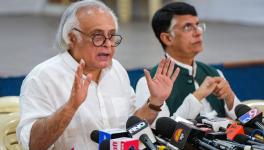Awarding Govt Contracts to Big 4 Violates Spirit of Atmanirbhar Bharat

The Securities and Exchange Board of India (SEBI) has recently shortlisted six entities, including three of the Big 4 global accountancy firms -- EY, KPMG and PwC -- for implementation of a custom-made governance policy.
The other three shortlisted bidders are RSM Astute Consulting, BDO India and ANB Solutions.
The stated purpose of the exercise is to have in place policy documents, standard operating procedures (SOPs) and other information technology (IT) documents, as per the best industry standards and practices. It is aimed at reducing operating costs and enhance performance by establishing clear criteria for computer network, hardware, software, information security, and information technology (IT) vendor management.
The purpose cannot be faulted. But, it is the inclusion of EY, KPMG and PwC amongst the short-listed bidders that is bound to raise eyebrows. Let alone being shortlisted, these firms should not have been allowed to even bid in the first place, as all of them have been linked with major scams. All three and have at different times been probed by SEBI itself, the Serious Frauds Investigation Office (SFIO), the Enforcement Directorate (ED) etc.
A fundamental issue begs an answer. Why does “Atmanirbhar Bharat” not apply to the Big 4 (including Deloitte). A mountain of evidence has existed for decades that the Big 4 are controlled directly by their overseas parents.
Is there so much scarcity of Indian talent that we need MNCs to execute such simple projects? If so, we should collectively hang our heads in national shame.
This gives us all the more reason to vigorously pursue the Prime Minister’s call for “Be vocal, go local”. Only then his dream in 2017 of having at least four Indian chartered accountancy (CA) firms in the list of Big 8 by 2022 will fructify.
But first, a refresher on the rather poor credentials of some of these short-listed bidders.
EY
The latest scam to besmirch EY is the Wirecard scandal that is unfolding in Germany. The payment company has filed for insolvency, admitting that 1.9 billion euros (approximately Rs 17,000 crore) of cash probably never existed.
EY had been Wirecard’s auditors for almost a decade. However, for the past three years, EY failed to check Wirecard’s bank statements, an elementary audit procedure.
The Wirecard scandal bears a striking resemblance to the Satyam Computer scam in 2009. Some Rs 5,000 crore of bank balances of Satyam were found to be fictitious. Satyam’s auditors for several years, Price Waterhouse, had also failed to obtain direct confirmation from the banks concerned despite multiple prodding from one of its overseas partners.
KPMG and Deloitte
A few months ago, the Ministry of Corporate Affairs (MCA) had sought to levy a five-year ban on BSR & Associates LLP, a KPMG affiliate and Deloitte Haskins & Sells LLP (Deloitte), in connection with the Rs 90,000 crore scam at Infrastructure Finance and Leasing Services (IL&FS) in 2018.
MCA’s action came on the basis of a report running into more than 30,000 pages, prepared by its investigative wing, SFIO. The Ministry had adjudged both KPMG and Deloitte prima facie guilty of ‘professional misconduct’.
The Bombay High Court, however, found gaping holes in MCA’s action and, as explained in my earlier article , had struck down MCA’s efforts to ban the two firms vide its order dated April 21, 2020. The matter is sub judice before Supreme Court.
PwC
It is rather challenging to recount PwC’s chequered track record in a few words.
In the Satyam scam, SEBI had, vide its order dated January 10, 2018, banned, for two years, 11 firms belonging to the network of Price Waterhouse, from auditing listed companies. In addition, it ordered ‘disgorgement of wrongful gains’ of approximately Rs 26 crore (including interest) by Price Waterhouse.
In September 2019, the ED slapped a Rs 230 crore penalty on Pricewaterhousecoopers Pvt. Ltd. (Pwcpl), the consultancy arm of PwC India. A week earlier, it had served notices on Pwcpl, its current chairman, two past chairmen and some of its directors.
The ED found that Pwcpl had received investments of Rs 230 crore from Pricewaterhouse Services BV, Netherlands, but had falsely shown them as “Grants” to avoid attracting provisions of the Foreign Exchange Management Act, 1999 (FEMA), which required prior approval from the Reserve Bank of India (RBI).
RBI’s approval could not have been granted since the extant legislations did not permit PwC to receive investments from overseas. The ED probe, which is yet to be completed, had started only on the directions of the Supreme Court pursuant to a public interest litigation (PIL) filed before it.
The latest controversy to engulf PwC is what is now emerging as the Kerala gold smuggling case. A key figure in the controversy is one Swapna Suresh, who was working as the operational manager at Kerala State IT Infrastructure Ltd. She is stated to be facing a crime branch probe for allegedly fabricating a report against an Air India official.
There are also reports that Suresh got the job through the consultant, PwC. To be fair, Pwc has contested this allegation and has reportedly said that individual concerned was on the payroll of a third party agency that provides specialised short-term resources to them. “The agency has done necessary background verification,” PwC reportedly said.
No Smoke Without Fire
Many of the allegations, controversies etc. are yet to reach their logical conclusion. But it is equally important to appreciate another dimension. Projects, such as the one initiated by SEBI, take a long time to complete. Frequent interaction with internal staff and consultants is necessary and inevitable, both during and after the project completion, till such time that it is fully streamlined. The casualty is independence. In such a scenario, the client/regulator cannot be expected to take action against its consultant, whom it is otherwise supposed to regulate.
The core of SEBI’s mandate is investor protection. To avoid conflict of interest, those who are supposed to be regulated should not be allowed to devise or be involved intimately with the very system that will regulate them. An examinee cannot decide the syllabus, frame the question paper and be the evaluator, too.
The Big Four not only audit but also render consultancy services to at least 60-70% of the companies listed on the Bombay Stock Exchange and the National Stock Exchange.
Defence Taken by Big Four
A defence often put forth by the Big Four is that their consultancy arms are independent and separate legal entities from their audit firms, which may have come under some cloud.
This smokescreen rests on thin ice. The alter ego, i.e., the controlling mind, is common across entities, though for decades this has been overlooked by the regulators.
SEBI is not Alone
The three accountancy majors -- PwC, EY and KPMG -- have also qualified the technical evaluation round for assisting the Department for Promotion of Industry and Internal Trade (DPIIT). This project is for effective and on- ground implementation of initiatives for startups.
Another MNC: Grant Thornton India LLP, which has been used often by SEBI and others to conduct forensic audits, failed the technical test. Did not being embroiled in any major scam go against it?
Civil Society Recommendations
The Citizens Whistle Blower Forum (CWBF), formed under the Chairmanship of Justice A.P. Shah, former Chief Justice of Delhi High Court and former Chairman of the Law Commission had, since 2017, recommended more than once to Prime Minister and Finance Minister that PwC should not be awarded government contracts given its alleged involvement in various scams.
The other esteemed members of CWBF include Admiral Ramdas, former Navy Chief, E.A.S Sarma, former Secretary, Government of India, Wajahat Habibullah, the country’s first Chief Information Commissioner, Aruna Roy, social activist and former IAS officer, Prashant Bhushan, lawyer/activist and Jagdeep Chokkar, former professor at IIM-Ahmedabad.
The core of CWBF’s recommendations, in my view, was to uphold the Rule of Law, avoid conflict of interest and maintain the sanctity of independence. This is feasible only when a Chinese wall is maintained at all times between the regulator and regulatee.
Way Forward
The Big 4, who render audit and consultancy services, therefore, should not be granted contracts involving the regulator, who is expected to regulate them. Their involvement in scams must rule them out of all government contracts to send the right message to the society.
All efforts must be given to fully Indian companies who possess the necessary expertise and experience. There is no dearth of talent in the country. Projects, like the one initiated by SEBI and DIPP, can we well handled by companies, such as TCS, Infosys, Wipro etc., in conjunction with some Indian but relatively small audit firms. The expertise of retired SEBI officials, stock market intermediaries, sector and industry experts should also be leveraged.
If inevitable, companies, such as Accenture, Mckinseys, Bain Capital, A.T. Kearney among others could be involved since there will be no threat of conflict of interest.
Foreign direct investment or FDI in retail mandates that a specified percentage of goods must be sourced from India. On the same lines, these MNCs must be persuaded to outsource a specified percentage of the business to Indian audit firms. This will be a win-win for all. Fixed cost for MNCs will reduce, while Indian firms will be able to upgrade their skills and knowledge.
The above suggestions will help convert the PM’s dream into reality of seeing at least 4 Indian audit firms in the Big 8 by 2022.
Those who matter must make full use of these suggestions given by civil society, professionals and sector experts to ensure that transparency, accountability and governance are not reduced to mere buzz words.
Sarvesh Mathur is a senior finance professional who has earlier worked as CFO of Tata Telecom and Pricewaterhousecoopers (India). The views are personal.
Get the latest reports & analysis with people's perspective on Protests, movements & deep analytical videos, discussions of the current affairs in your Telegram app. Subscribe to NewsClick's Telegram channel & get Real-Time updates on stories, as they get published on our website.
























